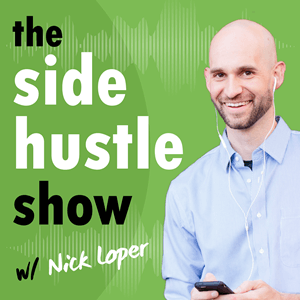
Why should your first online business be a directory? This is one of the most overlooked yet potentially lucrative side hustles out there.
I’ve got a little bit of experience in this space (I actually built a virtual assistant directory years before), so this is something close to me.
But John Rush is a master at quickly building and marketing these little side projects.
He has launched 30 directories in just the past year, managed to monetize 10 of them, and even sold one (AllGPTs.co) for a sweet five-figure exit.
(If you want more resources, check out John’s full Directory Guide or his no-code builder at Unicorn Platform.)
Tune in to Episode 647 of the Side Hustle Show to learn:
- Why directories are a great starter side hustle
- How to pick the right niche
- The tools and strategies to build your directory
Sponsors
- Airbnb — Discover how much your home could be worth and find a professional co-host today!

- Indeed — Start hiring NOW with a $75 sponsored job credit to upgrade your job post!
- Mint Mobile — Cut your wireless bill to $15 a month!
- Gusto — Get 3 months free of the leading payroll, benefits, and HR provider for modern small businesses!
Why Online Directories Make a Great Side Hustle
So why should you invest your weekends into building a directory?

1. Attention Is the Most Scarce Resource
We’re living in a world where attention is scattered everywhere — TikTok, Instagram, AI chatbots — you name it. And in this world, people are craving trusted, curated sources of information.
Directories are curated marketplaces—think TripAdvisor for vacations or Upwork for freelancers. And they’re like a mini-Google for your specific niche, but with actual human expertise behind it.
They save people time and give them confidence in their choices.
2. Easier to Win with SEO
Compared to traditional blogs or SaaS projects, directories are SEO-friendly. People aren’t always looking for an answer—they’re looking for a place to find answers.
Google loves directories because they group related resources in one spot.
3. High Revenue Potential
Directories can start as small weekend projects and scale into major businesses.
Examples are TripAdvisor, Airbnb, and Craigslist, which all started as simple directories.
How to Find Your Directory Idea
Picking the right niche is where it all starts. Here’s how to find your winning idea:
Start with What You Know
If you already know a niche well—dog training, podcast editing, solar panel installation—that’s a huge advantage. High-quality data wins every time.
Look for What People Are Searching For
Tools like Google, Quora, Reddit, and even Twitter/X can point you toward directory-worthy topics:
- Google Search: Type in a keyword like “dog” and look at the suggestions that comes up (e.g., shelters for dogs, trainings for dogs). Suddenly you’ve got ideas for directories about dog shelters, dog food, or dog training.
- Quora and Reddit: Look for questions with debate and diverse answers—if everyone agrees on one solution, there’s no need for a directory. But if people are arguing over what’s “best,” there’s directory potential.
Competition Is a Good Sign
If you search your niche and see other directories ranking, that’s actually a good thing. It means:
- People are actively searching for this information
- Google values directories in this niche
- There’s proven demand
The only red flag is if you see nothing but directories in the first 20 search results (like in the AI tools space). But as John tells it, “99% [of potential directories] are not created yet.”
Building Your Directory: Tools and Strategies
You’ve got your niche. Now it’s time to build.
Pick a Great Domain Name
Spend time finding a short, memorable .com or .org domain. It takes time finding a good domain name because most obvious ones have already been taken. So you just have to be creative.
Use a No-Code Website Builder
Forget about building from scratch. Don’t get caught up in the technical details.
Tools like Unicorn Platform (John’s platform), WordPress, or Webflow let you launch in a day and help you focus your energy on what really matters — the data.

Curate Your Data (Where the Real Work Happens)
Here’s where directories stand out:
- Find all the big players: These add credibility.
- Find hidden gems: These add value.
- Write custom descriptions: AI-generated fluff won’t cut it. You need unique, insightful copy.
Start simple: Title, URL, description, and category.
The magic happens in how you write the descriptions. Don’t just list features — help people make decisions.
What makes each listing unique? Why might someone choose this option over others?
Marketing Your Directory: How to Get Traffic
Building the directory is just step one. Now you’ve got to get people to it.
1. Build Backlinks (Without Being Spammy)
The best part about directories is they’re shareable. You can drop your link into answers on Quora, Reddit, LinkedIn, or Twitter without getting flamed.
But don’t just drop your link — give a few specific recommendations based on their needs, then mention your directory as a resource for more options.
2. Create Blog Content
Use the data in your directory to create content like:
- Top 10 Microphones for Podcasting
- The Most Popular Microphones This Month (Based on Our Directory)
3. Build Little Tools
Tools like a broken link checker or a simple calculator can bring traffic and build trust. They’re easy to make with AI and can set your directory apart.
Monetizing Your Directory
John shared several proven monetization strategies:
- Sponsorships: especially powerful in niche markets
- Paid listings: let businesses pay for premium features like extra details or a verified badge
- Lead generation (huge for high-ticket items): think podcast editors (a service you’ll use for years) or solar installers
- Affiliate partnerships: add affiliate links for products in your directory
- Newsletter sponsorships: send regular updates with sponsored items
- Freemium models: offer basic listings for free, but charge for premium placements
- Sell data: for directories with valuable research
Mistakes to Avoid
John’s learned a lot building 30 directories. Here are his biggest tips to avoid rookie mistakes:
The shorter your domain name, the better your traffic.
Skip those long, keyword-stuffed domains like “best-places-to-eat-sushi-in-chicago” and go for something short and memorable.
Also, make sure that your directory is something that people will want to use.
“ Directories are easy to build, but it’s really hard to make it great,” John shared.
Anyone can throw together a list of links and call it a directory, but most people treat building directories like a school assignment — that mentality of doing just enough to get by. And that approach will absolutely tank your chances of success.
What’s Next for John?
John’s taking everything he’s learned from launching these directories and packaging it up in what he calls the Founder Guide.

It’s not just about directories anymore (though that’s still a big part of it) — he’s expanding into micro SaaS projects, no-code platforms, and all sorts of amazing areas.
For example, he’s working on an AI agent specifically for directories — something that helps with the heavy lifting of data curation, enrichment, and even helps you reach out to businesses to claim their listings.
John’s #1 Tip for Side Hustle Nation
“Enjoy the process, not the outcome.”
“Be better today than yesterday.”
Episode Links
- JohnRush.me
- AllGPTs.co
- Directory Guide
- Founder Guide
- Unicorn Platform
- TikTok
- AI chatbots
- TripAdvisor
- Upwork
- SaaS
- SEO-friendly
- Airbnb
- Craigslist
- Quora
- Twitter/X
- WordPress
- Webflow
Serious About Making Extra Money?
- Start Your Free $500 Challenge. My free 5-day email course shows you how to add $500 to your bottom line.
- Join the free Side Hustle Nation Community. The free Facebook group is the best place to connect with other side hustlers and get your questions answered.
- Download The Side Hustle Show. My free podcast shares how to make extra money with actionable weekly episodes.







No responses yet